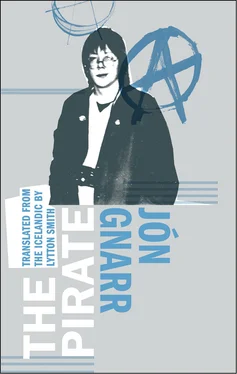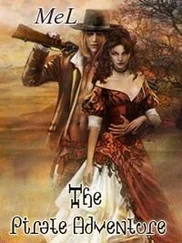“Onetime hippie, always a fucking hippie!”
Hannes also had an idea for a song. He hummed the melody for Alli, who tapped it out on guitar and added to it. They played the song and I recorded it on tape. I was given the task of composing lyrics. That night, I sat down with a notepad and pen and listened to the song over and over again while I wrote the words:
Anarchy and Freedom
Anarchy and freedom is what I want
Fuck the government!
You can’t say I can’t do what I want
Fuck you fascist pig!
Everybody thinks they know
What is right and what is wrong
But they don’t know shit
And that’s why I’m singing this song
Fuck the police and fuck the schools
They are just a bunch of fools
Fuck the armies and the church
Anarchy and freedom rules!
I could scarcely believe my own eyes. I’d written my first lyrics. They weren’t even that bad. This was an authentic punk song. I played the song and crooned the text. I was no longer just a spectator but a participant. I was so excited that I didn’t sleep until dawn.
And so songs were made one after the other. Alli and Hannes wrote melodies, and lyrics came from here and there. One, for example, we borrowed from the poet Stein Steinarr. I wrote a few, and Alli’s dad wrote one. It was called “Battle in Beirut.” The song was slow and gloomy, and although I had no idea where Beirut was on the map, I sang mournfully and gravely:
Battle in Beirut
bombs hover
houses collapse as carrion-fire tears
people fleeing rockets firing
in crazy fear
lies a crazy world
After a few weeks and incessant practice we’d gotten a few songs. We’d become a real band. Alli and Hannes were excited to go play somewhere, but I was hesitant and rejected the idea. Although I wanted to stand onstage and scream, like a rock star, “In crazy fear lies a crazy world,” I also had no enthusiasm for doing it. I felt stupid and ugly. My glasses were silly, and I couldn’t take them off because then I couldn’t see anything. What’s more, I had these weak, dull, pale eyes. And then there was that damn lack of timing. I knew that it would only get considerably worse when I was nervous. I would drop out in the middle of a song and totally spoil it or embarrass myself. I was even nervous if some friend of ours was in the garage. I found it awkward, and I began to get distracted even more than usual during songs, forgetting lyrics and garbling. But I couldn’t admit it to anyone. I couldn’t tell Hannes and Alli that all their relentless practice would be for nothing because the singer was shy and would probably never sing onstage. I made up countless excuses, claiming to have a headache or coming up with something I said was bothering me, either about the lyrics or the tune. There was always something to fix before we could play in public. I went round in countless circles in my head, thinking about anything that wasn’t quite right, and the more I thought, the more I became unqualified to change it. The boys showed an incredible understanding, waiting patiently for me to be ready to step onstage. As a compensation, we celebrated with a concert in the garage and recorded it on tape. Then we sat in a room and listened, fascinated, to the best punk band in the world, which had never played in public because the chief instigator was too shy.
Since we couldn’t launch the band with a gig, we launched it another way. We all bought thick markers and wrote NEFRENNSLI wherever we could; on bus shelters, shop walls, road signs, and any place that had already been defaced. The band’s logo was N with a ring around it and an arrow out; little by little the band became famous even though no one had heard of it. I was even widely known as “the singer of Nefrennsli.” I was a recognized singer in a punk band that had never held a concert. As the band’s reputation and mine grew, I became more of a wallflower, grew ever more anxious about launching. Wasn’t it just fine this way? Couldn’t we just hold a concert for ourselves in the garage? Did we need some launch somewhere hanging over our heads? It was better that people thought I was going to be great than if they saw that I was lousy. But more and more people asked about the band, and we got requests and invitations to play at gigs. Alli and Hannes were excited, but I always found some excuse.
“We can’t play this weekend: I’m definitely getting a sore throat.”
We decided to send a tape recording of our music to a radio station. We sent them the song “Bad World,” which we thought was our best song so far. We thought this song would be a hit, not only in Iceland but also overseas, since it was in English. A few days later, a manager from the radio program rang Hannes. He said he’d listened to the song and wanted to interview the band. Full of awe and with thundering heartbeats we walked into the radio station on Skúlagata. We were ushered into the studio; the host welcomed us and offered us seats. I felt like I was standing on the precipice of world fame. I was doing an interview on national radio. Every Icelander would hear us interviewed and listen to our song. We’d become famous. When the interview began, I was seized with a choking tension. My mouth dried up and my palms sweated. My heart was pounding in my ears. The presenter introduced the band for the listeners and said something about a growth in Icelandic garages. Then he turned to us and asked us to introduce ourselves and say what we played. All the descriptions and cool phrases we’d planned to use were forgotten; shyness took over. We stammered and mumbled over one another. The presenter tried to start with something light and asked us about the name of the band and whether we always had colds. We didn’t really understand his point. Alli said yes and I said no. I was so nervous and agitated my ears felt stopped up. He told the audience that he had listened to our demo, and I tried to get a sense of what he felt about it, but there was no way to tell.
“You know something about playing instruments, boys?”
“No,” we muttered unanimously. “Nothing at all.”
“Nothing at all?”
“I just know how to play guitar,” said Alli softly.
“We just do what we can,” I muttered.
“Don’t you need to know how to in order to play?”
We flat out disagreed that it was necessary.
“Don’t you need a lot of money for musical instruments?”
I went bright red. What he was really talking about? Why was he asking us about this? Where exactly was he going with this? Why didn’t he ask us about the lyrics?
“You can just borrow instruments,” said Alli, loudly.
The old man looked at us playfully.
“Can you all simply become musicians without knowing a blessed thing about instruments?”
“Yes,” I said.
“No,” Alli stated.
I looked accusingly at Alli.
“You might have to know a little tiny bit,” he added.
“Maybe some chords,” I said cockily, by way of explanation.
“And a drum line,” Hannes shot in.
“That’s enough,” I said.
The presenter looked searchingly at us for a while. We were silent. Outside, the Icelandic nation was sitting, breath held, listening. I struggled to find something interesting to say, to bring up some cool slogan or something like that, but the stress weighed too heavily on me. I could barely get my breath, and the familiar feeling of suffocation poured over me. My hands shook, and I was afraid that listeners could hear my heartbeat booming in their radios.
“How do you compose the lyrics?”
“He writes them,” Alli said, pointing at me.
“I write them,” I said.
Alli and Hannes nodded their heads in agreement. I felt that the lyrics affected everything and considered them more important than the music. To my mind, the music was just a framework for the words.
Читать дальше











